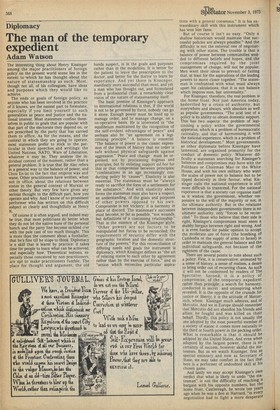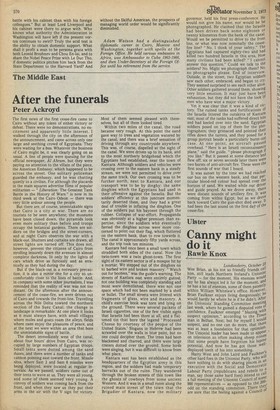Diplomacy
The man of the temporary
expedient
Adam Watson
The interesting thing about Henry Kissinger among the major practitioners of foreign policy on the present world scene lies in the extent to which he has thought about the nature of statesmanship as such. Most, though not all, of his colleagues, have ideas and purposes which they would like to achieve.
The ends or goals of foreign policy, as anyone who has been involved in the practice of it knows, are the easiest part to formulate, , especially if you limit yourself to such generalities as peace and justice and the na tional interest. Most statesmen confine them selves in public to goals that are popular with that part of the electorate they depend on, or are prescribed by the party that has carried them to office. As for the means, and the context in which they are going to operate, most statesmen prefer to stick to the par ticular in their speeches and writings: the United Nations, NATO, Wars of Liberation, whatever it may be. They analyse the in dividual context of the moment, rather than a general problem. It is true that Sir Alec refers in a general way to the balance of power, and Chou En-lai to the fact that empires wax and wane. Other practitioners have written, when not in office, about the relations between states in the general context of Marxist or other theory. But very few have given any serious thought to the difficult part, how you operate and why. And I know of no prominent performer who has written on this difficult subject so clearly and thoughtfully as Henry K.
Of course it is often argued, and indeed may be true, that most politicians do better when they do not let the native hues of the personal hunch and the party line become sicklied o'er with the pale cast of too much thought. This is more than the comment about a footballer, that he's fine till he stops to think. Diplomacy is a skill that is learnt by practice: it takes time for people to learn what can be achieved, and especially how. Theoretical notions, especially those conceived by non-practitioners, are apt to make practitioners fumble. The place for thought and argument, the old hands suspect, is in the goals and purposes rather than in the modalities. It is better for the patient to leave the prescription to the doctor, and better for the doctor to learn by experience. And yet there is Kissinger, manifestly more successful than most, and yet • a man who has thought out, and formulated from a professorial chair, a remarkably clear vision of the nature of statesmanship itself. The basic premise of Kissinger's approach to international relations is that, if the world is not to be governed by force, nobody can go it alone. Enough power must be lined up to manage order, and to manage change, on a co-operative basis. He is interested in "the equilibrium maintained by the recognition of the self-evident advantages of peace" and perhaps also by "an agreement on a legitimising principle." A balance is essential. "The balance of power is the classic expression of the lesson of history that no order is safe without physical safeguards against aggression." Peace and change must be organised, not by proclaiming dogmas and principles, but by enlisting support ad hoc for this or that compromise between principles: "combinations in an age increasingly conducting policy by 'causes'". Elasticity is also essential. The statesman must be "always ready to sacrifice the form of a settlement for the substance." And with elasticity about forms the statesman must also have a respect, an understanding, of the goals and purposes of other powers opposed to his own. Compromise is not trickery: it is harmony in place of discord. The statesman's successes must become, so far as possible, "not wounds, but definitions of a continuing relationship." That is the essence of the Kissinger style. "Other powers are not factors to be manipulated but forces to be reconciled; the requirements of security differ with the geographic location and the domestic structure of the powers." For this reconciliation of differing needs and goals the instrument is diplomacy, which Kissinger defines as "the art of relating states to each other by agreement rather than by the exercise of force," and as "action which reconciles particular aspira tions with a general consensus." It is his extraordinary skill with this instrument which has won him fame.
But of course it isn't so easy. "Only a shallow historicism would maintain that suc cessful policies are always possible." And the difficulty is not the external one of negotiating with other states. The trouble is that a balance of power between communities wed
' ded to different beliefs and hopes, and the compromises required by the joint
management of change, will not be popular.
Men want their ideas to prevail; or failing that, at least for the aspirations of the leading powers to move closer together. "The statesman is confronted with what must always upset his calculations; that it is not balance which inspires men, but universality."
For Kissinger, therefore, the real problem is the home front. Not just America today, bedevilled by a crisis of authority, but everywhere and always, with absolute as well as popular governments. "The acid test of a policy is its ability to obtain domestic support. This has two aspects: the problem of legitimising a policy within the governmental apparatus, which is a problem of bureaucratic rationality, and that of harmonising it with the national. experience, which is a problem of historical development." Most governments, as other diplomats before Kissinger have lamented, are organised primarily for the conduct of domestic policy. Whatever difficulty a statesman searching for Kissinger's balances and compromises may have with the Politburo or Chairman Mao or the White House, and with his own military who want the scales of power not to balance but to be tipped decisively in their favour, what Kissinger calls the national experience is still more difficult to transcend. For the national experience is that a society can organise itself as it wishes: the government, whether responsive to the will of the majority or not, is the ultimate authority. But in the relations between independent governments there is no ultimate authority, only "forces to be reconciled." To those who believe that their side is right, Kissinger's compromises must seem a shabby bargain between right and wrong. And it is even harder for public opinion to accept the moderate use of force (the bombing of Cambodia or the supply of arms to Israel) in order to maintain the general balance and the individual safeguards, not because of the rightness of the cause.
There are several points to note about such a policy. First, it is conservative: animated by a sense of history, a sense of realism, a desire to bring order out of recurring chaos. As such it will not be condemned by readers of The Spectator. Second, it is a policy of compromise, of the temporary expedient rather than principle; a search for harmony. conducted in secret and uninspiring when revealed. It is the opposite of the crusade for justice or liberty; it is the attitude of Metternich, whom Kissinger much admires, and of Mercutio. And we in Europe should remember that Mercutio did not abandon his friends and allies: he fought and was killed on their behalf. Thirdly, this policy is not usually the one adopted by the most powerful member of a society of states: it comes more naturally to the third or fourth power in the pecking order. What is remarkable is that it should be adopted by the United States. And even when adopted by the largest power, there is no certainty of success, however skilful the sta
tesman. But as we watch Kissinger, first as special emissary and now as Secretary of State, we may take comfort in the fact that here is a performer of undoubted skill at his chosen game. And lastly we may accept Kissinger's own Verdict that what is likely to undo "the sta
tesman" is not the difficulty of reaching a
bargain with his opposite numbers, but the home front. Castlereagh, he wrote ten years
ago when he was a don at Harvard, "in ever), negotiation had to fight a more desperate
battle with his cabinet than with his foreign colleagues." But at least Lord Liverpool and his cabinet were there to argue with. Who knows what authority the Administration in Washington will have left if the present vortex continues to swirl? Truly the acid test is the ability to obtain domestic support. What shall it profit a man to be persona grata with both Leonid Brezhnev and Chou En-lai, and to share the Nobel Peace Prize with Le Duc Tho, if domestic politics pitches him back from the State Department to the Harvard Yard? And without the Skilful American, the prospects of managing world order would be significantly diminished.
Adam Watson had a distinguished diplomatic career in Cairo, Moscow and Washington, together with spells at the Foreign Office. He held various embassies in Africa, was Ambassador to Cuba 1963-1966, and then Under-Secretary at the Foreign Office until his retirement from the service.



































 Previous page
Previous page